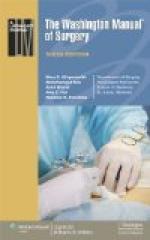Fat.—Adipose tissue has a low vitality, but it is easily retained and it readily lends itself to transplantation. Portions of fat are often obtainable at operations—from the omentum, for example, otherwise the subcutaneous fat of the buttock is the most accessible; it may be employed to fill up cavities of all kinds in order to obtain more rapid and sounder healing and also to remedy deformity, as in filling up a depression in the cheek or forehead. It is ultimately converted into ordinary connective tissue pari passu with the absorption of the fat.
The fascia lata of the thigh is widely and successfully used as a graft to fill defects in the dura mater, and interposed between the bones of a joint—if the articular cartilage has been destroyed—to prevent the occurrence of ankylosis.
The peritoneum of hydrocele and hernial sacs and of the omentum readily lends itself to transplantation.
Cartilage and bone, next to skin, are the tissues most frequently employed for grafting purposes; their sphere of action is so extensive and includes so much of technical detail in their employment, that they will be considered later with the surgery of the bones and joints and with the methods of re-forming the nose.
Tendons and blood vessels readily lend themselves to transplantation and will also be referred to later.
Muscle and nerve, on the other hand, do not retain their vitality when severed from their surroundings and do not functionate as grafts except for their connective-tissue elements, which it goes without saying are more readily obtainable from other sources.
Portions of the ovary and of the thyreoid have been successfully transplanted into the subcutaneous cellular tissue of the abdominal wall by Tuffier and others. In these new surroundings, the ovary or thyreoid is vascularised and has been shown to functionate, but there is not sufficient regeneration of the essential tissue elements to “carry on”; the secreting tissue is gradually replaced by connective tissue and the special function comes to an end. Even such temporary function may, however, tide a patient over a difficult period.
CHAPTER II
CONDITIONS WHICH INTERFERE WITH REPAIR
SURGICAL BACTERIOLOGY
Want of rest—Irritation—Unhealthy
tissues—Pathogenic bacteria.
SURGICAL BACTERIOLOGY—General
characters of
bacteria—Classification
of bacteria—Conditions of bacterial
life—Pathogenic
powers of bacteria—Results of bacterial
growth—Death of
bacteria—Immunity—Antitoxic sera—Identification
of bacteria—Pyogenic
bacteria.
In the management of wounds and other surgical conditions it is necessary to eliminate various extraneous influences which tend to delay or arrest the natural process of repair.




